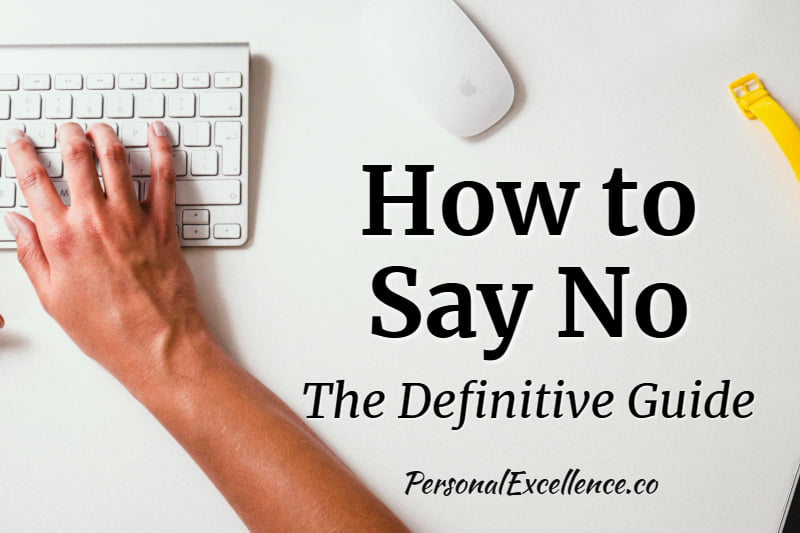How To Say No To Others – Personal Excellence

“I find it difficult to say no to people and often, I end up with too many commitments. But if I say no, I worry about them being unhappy or offended. How can I learn to say no and not end up feeling bad about it or not offending the other person?” – Ruth
Do you hate saying no? Are you always saying yes to others at the expense of yourself?
I used to have great difficulty saying no. Whenever someone asked me for help, be it for a personal favor or to pick my brain for free, I would say yes. Part of it was because I didn’t want to leave them in the lurch or to disappoint them. Another part was because I was afraid that the other person would be unhappy with me if I said no, hence creating conflict. As a Chinese, I was taught that creating conflict is a big no-no, and that I must always preserve harmony at all costs, even at the expense of myself.
Over time though, I realized that saying yes to others, particularly things I don’t really want to do, comes with consequences. Because I kept saying yes to everyone, I had little time for the things on my plate. My days would be filled with things that others wanted from me, with no time for my own to-dos. While I was running around in the day, busy fulfilling people’s expectations, I would be tired out at night, with nothing completed on my list. In the end, I kept putting off my sleep just to get my own stuff done.
It wasn’t long before I became really burnt out, miserable, and unhappy. I realized that my time was no longer my own — it was taken over by what others wanted from me, and my own desire to always be there for others.
Why We Need To Say No
In an ideal world, we want to say yes to everyone, sure. But as you can see from my case, saying “yes” to everyone isn’t the way to go. Saying no is important for many reasons, such as
- To manage your time. In an ideal world where we have unlimited time, we could easily say yes to everything. But the reality is that we have limited time a day. In order to get things done, we need to say “no.”
- To set boundaries. When you don’t draw a line between your needs and others’ needs, people will assume that you should give by default. When you say no, you start to set boundaries and protect your personal space.
- To have time for your Quadrant 2 goals. Quadrant 2 goals are the most important goals in your life, such as finding your passion, starting your business, and building your relationships with your loved ones. Saying no is about protecting your Q2 goals and making sure that you have time for these goals.
- To be happy. When you say no, you control your time. You control what goes into your day. And you get back to being in the driver’s seat of your life.
What Stops Us From Saying No?
Yet for many of us, we find it tough to say no. This can be due to reasons such as:
- Fear of being rude. You are afraid that if you say no, you would be regarded as being rude. I was brought up thinking that saying no, especially to older people, is rude. This is especially so in the Asian culture where seniority is valued and disagreement is seen as defiance.
- Desire to conform. You want to be a positive and well-liked person, so you say yes. You don’t want to be seen or labeled as difficult.
- Fear of conflict. You are afraid the person may get unhappy if you reject him/her, which may lead to an ugly confrontation.
- Afraid to burn bridges. Some people take “no” as a sign of rejection, and you’re afraid to burn bridges.
- Fear of lost opportunities. You are worried that saying no means closing the door to new opportunities.
- You want to help. Deep down, you want to help the person. So you say yes even though you really can’t afford the time.
Yet these are not real reasons to say no. Why do I say that?
- Saying no doesn’t mean that you’re being rude.
- Neither does it mean that you’re being disagreeable. Having an opinion is part of being an individual. If we say yes all the time to things that we don’t want to do, then we’ll be busy doing things that others want us to do, not things that we want to do.
- Saying no doesn’t mean creating conflict — it’s about asserting your needs and boundaries. If we don’t assert ourselves, people end up assuming that we are okay with something when we are not.
- Saying no also doesn’t mean a loss of opportunity. It’s more important to say yes to the right things and opportunities rather than to say yes to everything, including things that are irrelevant to you.
- Last but not least, when we keep helping others without regard for ourselves, we end up sacrificing our personal goals, our time with our loved ones, and our health. We need to first say yes to ourselves before we can be of service to the world.
Ultimately, it’s your right to say no. Every “yes” comes with its costs — the commitment, the time, and the effort to honor the request. While the cost may be small for each “yes,” little trickles of yes’es over a long time will eventually deviate you from your long-term goal.
How to Say “No”
When it comes to saying no, you want to achieve two aims: you want to say no effectively, and you want to say no tactfully. Here are my 7 tips to say no.
1. Be direct
Assuming that you already know that you want to say no, it’s easier to say “no” right away rather than put it off. The longer you stall, the more complicated it becomes, because now you have the added pressure of explaining why you took so long to reply. Just be direct and get to the point.
As a general rule, whenever I find it hard to reject someone, I have a two-sentence rule to get it over and done with. Start off with a “Sorry, I can’t.” Then, give your reason in one sentence. (Or if you don’t want to give a reason, just end it there.) Limiting your rejection to two sentences makes the rejection easier, because rather than give some lengthy explanation about why you can’t do something, which makes you procrastinate saying no, you cut right to the chase. Even if you end up replying in 3-4 sentences or more, the 2-sentence rule helps you get started.
E.g.
- “I’m sorry, I can’t make it for this appointment.”
- “I’ll pass this round, sorry about that.”
- “This doesn’t meet my needs at the moment. Thanks for having me in mind!”
- “I’m tied down with something and won’t be able to do this.”
2. Be sincere
Often times we are afraid that if we say “no,” we’ll burn bridges. So we hum and haw and pretend to be okay and say yes. Or we relent and say yes after the person persists.
Here’s the thing — most people will accept your no when you are sincere in your rejection. No games, no gimmicks. Just plain raw honesty, for example, “I’m not free to meet for this period as I’m busy with [X]”, or “This isn’t what I’m looking for, sorry about that.” The people who care enough will understand, while those who take offense probably have unhealthy expectations to begin with.
Note that this tip only works for people who respect your personal space. If you’re dealing with persistent folks who don’t respect your space, then it’s better to just say no without giving too much information.
3. Focus on the request, not the person
One of the reasons I struggled with saying no in the past was that I didn’t want to reject the person. My mom wasn’t there for me when I was a child (in that she was emotionally vacant as a person), and that made me want to be there for others. However, as I shared above, saying yes to everyone caused me to burn out. I was downright miserable.
In learning to say no, I learned to focus on the request and not the person. This means that instead of feeling obligated to say yes because I was afraid to let the person down, I learned to look at the request and assess if it is a fit with my plans. Is this something I can realistically do? Is this something I can afford to do right now? In light of all the things on my to-do list, can I do this without compromising on my other to-dos?
If the answer is a “no,” then I’ll reject it. It’s not about the person. It’s nothing personal. It’s simply about the request itself, and the request simply isn’t something I can fulfill at the moment. When you review requests as they are, you objectively reject requests that are not compatible with you, vs. feeling bad for saying no when it’s simply a necessary step in your communication with the person.
4. Be positive
We’ve been taught to associate no with negativity, and that saying no will lead to conflict. But it is possible to say “no” and maintain a harmonious relationship. It’s about how you do it.
To start off, stop associating “no” with negativity. Realize that it’s part and parcel of human communication. When you see “no” as a bad thing (when it isn’t), this negative energy will inadvertently be expressed in your response (when it doesn’t have to be). There’s no need to feel bad, feel guilty, or worry about the other person’s feelings (excessively). This doesn’t mean that you should be tactless in your reply, but that you should not obsess over how others will feel.
Next, when saying “no,” explain your position calmly. Let the person know that you appreciate his/her invite/request but you can’t take it on due to [X]. Perhaps you have conflicting priorities, or you have something on, or you simply have no time. You would love to help or get involved if possible, but it’s not something you can afford to do now.
Even though you are rejecting the person’s request, keep the options open for the future. Let the person know that you can always reconnect down the road to meet, collaborate, discuss possibilities, etc.
5. Give an alternative
This is optional, but if you know of an alternative, share it. For example, if you know of someone who can help him/her, then share the contact (with the person’s permission of course). This should only be done if you happen to know an alternative, not to compensate for not saying yes.
6. Don’t make yourself responsible for others’ feelings
Part of the reason I resisted saying no in the past was that I didn’t want to make others feel bad. I felt like I was responsible for how others would feel, and I didn’t want others to be unhappy.
The result was that I would bend over backward just to make others happy. I spent countless late nights catching up on work as I put others’ needs before myself and only had time for my own stuff at night. This was terrible for my health and well-being.
At some point, we need to draw a line between helping others and helping ourselves. To be of service to others, we need to prioritize our own health and happiness. Don’t make yourself responsible for others’ feelings, especially if they are going to respond negatively to your “no’s.” If the person accepts your “no,” great; if not, then that’s too bad. Do what you can, and then move on if it’s beyond what you can offer… which leads me to point #7.
7. Be ready to let go
If the person is disrespectful of your needs and expects that you should always say yes, then you might want to re-evaluate this relationship.
Too often we are taught to maintain harmony at all costs, which is why we dislike saying no — we don’t want to create conflict. But when a relationship is draining you; when the other party takes you for granted and the dynamics of the relationship is skewed in the person’s favor, then you have to ask yourself if this connection is what you want. A healthy relationship is one where both parties support each other. It’s not one where one party is constantly giving and giving, while the other person keeps asking and taking.
When I evaluate the relationships that drain me, I realize that they are the relationships where I’m not my real self, where I’m expected to say yes and the other party gets unhappy if I say no. For such relationships, the other person is unhappy as long as there’s a “no” — it doesn’t matter how the “no” is said as the person simply expects a “yes.”
If you’re dealing with such a person, then the question to you is, is this relationship worth keeping? If no, then it’s simple — simply let go of it. If this is an important relationship to you, then let the person know about this issue. It’s possible that they are not aware of what they are doing and an open, honest conversation will open their eyes to it.
So instead of worrying about saying no all the time with this person, which isn’t the real problem, you address the root of the issue — that you’re in a connection where you’re expected to be a giver. Perhaps in the process of doing this, you strengthen your relationship together. Because now you can be openly honest with him/her and say yes or no as you desire, without feeling any guilt, fear, or hesitation — which is what saying no should be about.
Check out these related resources:



